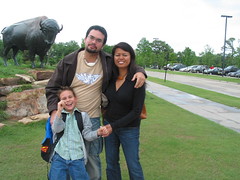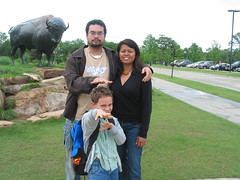Published on Friday, May 4, 2007 by The Globe and Mail (Canada)
More Than a Mine, A Metaphor
While The Mohawks and Ottawa Negotiated For The Land, The Land Itself Was Disappearing
by Naomi Klein
After a group of Mohawks from the Tyendinaga reserve blockaded the railway between Kingston and Toronto two weeks ago, a near unanimous cry rose up from the editorial pages of Ontario newspapers and talk radio: Get Shawn Brant. Yesterday, Mr. Brant, a beanpole of a man, walked into a packed Napanee courtroom with his wrists and ankles shackled after handing himself over to the Ontario Provincial Police.
According to court testimony, the arrest warrant on charges of mischief, disobeying a court order and breach of recognizance violated an agreement between police and demonstrators, who were given immunity when they peacefully ended the blockade. But Mr. Brant worried that the warrant for him would be used as a pretext for raiding a gravel quarry that he and several other community members from Tyendinaga have been occupying for the past six weeks. “We don’t want to bring that into the camp,” he told me.
The court granted Mr. Brant bail on condition that he is not allowed to “plan, incite, initiate, encourage or participate in any unlawful protest,” including those “that interfere in any way with commercial or non-commercial traffic on all public and private roads, airports, railways or waterways.” A trial date has not been set.
Why the determination to get Shawn Brant, and Shawn Brant alone? On the surface, the broken immunity agreement seems sure to inflame tensions. And whatever crimes Mr. Brant may have committed, he had plenty of company. But Mr. Brant has a theory. “Right now, I’m the voice. They think if they take away the people’s voice, the people will stop. They’ll see that they’re wrong, and that’s not all bad.”
Mr. Brant is more than a voice. He has become a symbol for the new militancy that is spreading through first nations communities across the country. Sitting beside the campfire at the occupied quarry a few days ago, Mr. Brant told me that since he was a kid, people in his community have been telling him to keep quiet. “It used to be, ‘Shawn, shut up, don’t say those things about the government, they’ll cut off our funding.’ Now it’s ‘Shawn, shut up, they’ll walk away from the negotiating table.’ ”
The reason Mr. Brant isn’t willing to let the negotiations take their course is that these talks are designed to take decades. And as the time passes, the land disappears. Forests are clear-cut, mountains are carved up, suburbs creep outward. Ineffective negotiations do not hold the line on an already unacceptable status quo - they contribute to the losing of very real ground.
At the gravel quarry near Deseronto, the loss of land is painfully, insultingly literal. The quarry is on land never ceded by the Mohawks of the Bay of Quinte, a fact the federal government has acknowledged. The only question is what form compensation for the theft will take. The Tyendinaga band council and Ottawa have been negotiating over that question since last November. The problem arose because, as the two parties talked, trucks were carrying 10,000 loads of newly crushed gravel out of the pit every year - an estimated 100,000 tonnes. While they bargained for the land, the land itself was disappearing.
When 150 people from the reservation took over the quarry and planted the Mohawk flag at the top of a mount of gravel, they had, and continue to have a single demand: Revoke the quarry’s licence until the negotiations have concluded. Or, as 28-year-old Jason Maracle put it to me, rather succinctly: “You’re not hauling away the very land we’re talking about.”
But it got worse. There was a pile of wood on the edge of the gravel pit that the people occupying the quarry used to feed their bonfire. As the pile depleted, it became apparent the wood had been covering up a large pile of garbage: old washing machines, leaking industrial batteries, oil filters, hydraulic fluid, bed frames, antifreeze. They explored some more and discovered it was all over the pit: piles of hastily covered junk, some of it half-burned, much of it toxic, including broken up pieces of asphalt from the highway. (You can still see the yellow lines.)
“When it rains, the whole mountain turns into a rainbow of chemical fluids and oils, all flowing down into the water. Then it all leeches into the ground water,” Mr. Maracle told me, pointing to the murky green pool at the bottom of the pit.
Not surprisingly, the mine has become a powerful metaphor, a vivid illustration of the failures of the negotiation process, and the problems with being patient. While the experts talk, good land is trucked out and toxic junk is trucked in - and without direct action, there would have been nothing left to talk about.
It’s an image with resonance on reservations across the country. With commodities from fuels to metals commanding record prices on the world market, the slow erosion of land has suddenly jumped into fast-forward, with a frantic push to open new mines and pipelines. Add to that the race to cut new ski hills and highways out of pristine mountains for the B.C. Olympics in 2010 and to build new town homes to feed Ontario’s housing boom and it’s easy to see why more and more native people are telling Shawn Brant to keep talking.
The final insult came when the federal Tories handed down a budget with next to nothing new in it to address first nations poverty. Mr. Brant makes an analogy between the way land disappears while negotiations stall and the way lives are degraded while funding is frozen. Birth rates are high, he points out, “so getting nothing means moving backward - more suicides, more disease, more contamination.” When “nothing” happens at the negotiation table, mountains and trees disappear; when “nothing” is in the budget, lives are extinguished.
The budget blow prompted Assembly of First Nations Chief Phil Fontaine to call for a national day of action on June 29. Though Mr. Fontaine insists he is not calling for cross-country blockades, many first nations are already planning them, with talk of a co-ordinated targeting of key infrastructure, from rails to roads. “It’s the same notion as a general strike,” Mr. Brant explains with a smile.
If the blockade strategy goes ahead, one thing is certain: There will be rivers of ink spilled explaining that, while native grievances are legitimate, there is no excuse for such disruptive tactics. Protesters will be told they are discrediting their cause, and they will be described as “violent” whether or not violence takes place. Mr. Fontaine has taken this finger-wagging to heart. “Let’s face it, if you irritate Canadians, they’re not going to listen to your message,” his spokesperson said recently.
Mr. Brant has a different message for non-native Canada - don’t just listen to us, join us. He points out that Canadians, even those who tell themselves they support native rights, “still treat them as a government problem.” But that’s not how social issues ever gain the kind of critical mass that leads to real change. “The environment is an issue right now because people told the government it was an issue,” Mr. Brant says. “If they said our concerns were an issue, they would be addressed too.”
Right now, everything is lining up for June 29 to be a day for natives to act and the rest of us to whine about late trains and traffic jams. But listening to Mr. Brant, it struck me that it could be something else: a day of action on native rights for the entire country, one when we all refuse to shut up.
Naomi Klein is the author of The Shock Doctrine: The Rise of Disaster Capitalism, to be published in September.
© Copyright 2007 CTVglobemedia Publishing Inc.

